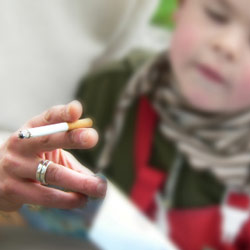Second-hand smoke may cause dependence in children

Monday, October 6, 2008 - 12:41
Scientists have a new warning for parents who smoke, as new research suggests exposure to second-hand smoke may lead to symptoms of nicotine dependence in kids who have never before had a cigarette.
A joint study among eight Canadian institutions found that five per cent of kids who are exposed to second-hand smoke in their homes or in cars exhibit symptoms of nicotine dependence.
The symptoms included cravings, feeling tempted to smoke when in the presence of others who smoke and having the feeling of being addicted to nicotine.
"We expected to see something like zero per cent, so we were surprised to see as many as five per cent," Mathieu Belanger, said lead study author and new research director at the Centre de Formation Medicale du Nouveau-Brunswick (French only) of the Universite de Moncton and Universite de Sherbrooke.
"There are two reasons why we feel that this is high. The first one is that kids are really, really young - 10 to 12 year olds - so we don't expect to see any symptoms of nicotine dependency in kids that young. The other thing is that those kids had never smoked before, not even one puff."
Researchers are concerned that the findings mean young people who never smoke but exhibit signs of nicotine dependence "pick up smoking and that they become addicted to it," Belanger said.
Belanger collaborated with researchers from the Universite de Montreal, the University of British Columbia, McGill University, Concordia University and the Institut national de sante publique de Quebec.
This is the first study to examine nicotine dependence in young people who have never taken up smoking.
Previous research has already exhibited the dangers of exposure to second-hand smoke, such as an increased risk of developing lung cancer.
"Like many other studies before, this one is giving a sign to parents not to smoke around their children," Belanger said.
Concerns over the impact of second-hand smoke on children have prompted some provincial governments in Canada to ban, or mull the idea of a ban, on smoking in cars when children are present.
The findings will have to be replicated in larger studies to confirm a link between second-hand smoke and nicotine dependence, Belanger said.
In the meantime, he and his fellow researchers are analyzing data from a five-year follow up study to determine if young people who exhibit signs of nicotine dependence are more likely to take up smoking.
A joint study among eight Canadian institutions found that five per cent of kids who are exposed to second-hand smoke in their homes or in cars exhibit symptoms of nicotine dependence.
The symptoms included cravings, feeling tempted to smoke when in the presence of others who smoke and having the feeling of being addicted to nicotine.
"We expected to see something like zero per cent, so we were surprised to see as many as five per cent," Mathieu Belanger, said lead study author and new research director at the Centre de Formation Medicale du Nouveau-Brunswick (French only) of the Universite de Moncton and Universite de Sherbrooke.
"There are two reasons why we feel that this is high. The first one is that kids are really, really young - 10 to 12 year olds - so we don't expect to see any symptoms of nicotine dependency in kids that young. The other thing is that those kids had never smoked before, not even one puff."
Researchers are concerned that the findings mean young people who never smoke but exhibit signs of nicotine dependence "pick up smoking and that they become addicted to it," Belanger said.
Belanger collaborated with researchers from the Universite de Montreal, the University of British Columbia, McGill University, Concordia University and the Institut national de sante publique de Quebec.
This is the first study to examine nicotine dependence in young people who have never taken up smoking.
Previous research has already exhibited the dangers of exposure to second-hand smoke, such as an increased risk of developing lung cancer.
"Like many other studies before, this one is giving a sign to parents not to smoke around their children," Belanger said.
Concerns over the impact of second-hand smoke on children have prompted some provincial governments in Canada to ban, or mull the idea of a ban, on smoking in cars when children are present.
The findings will have to be replicated in larger studies to confirm a link between second-hand smoke and nicotine dependence, Belanger said.
In the meantime, he and his fellow researchers are analyzing data from a five-year follow up study to determine if young people who exhibit signs of nicotine dependence are more likely to take up smoking.


